
Mira
Agentic AI System for Company Research
Stars: 63
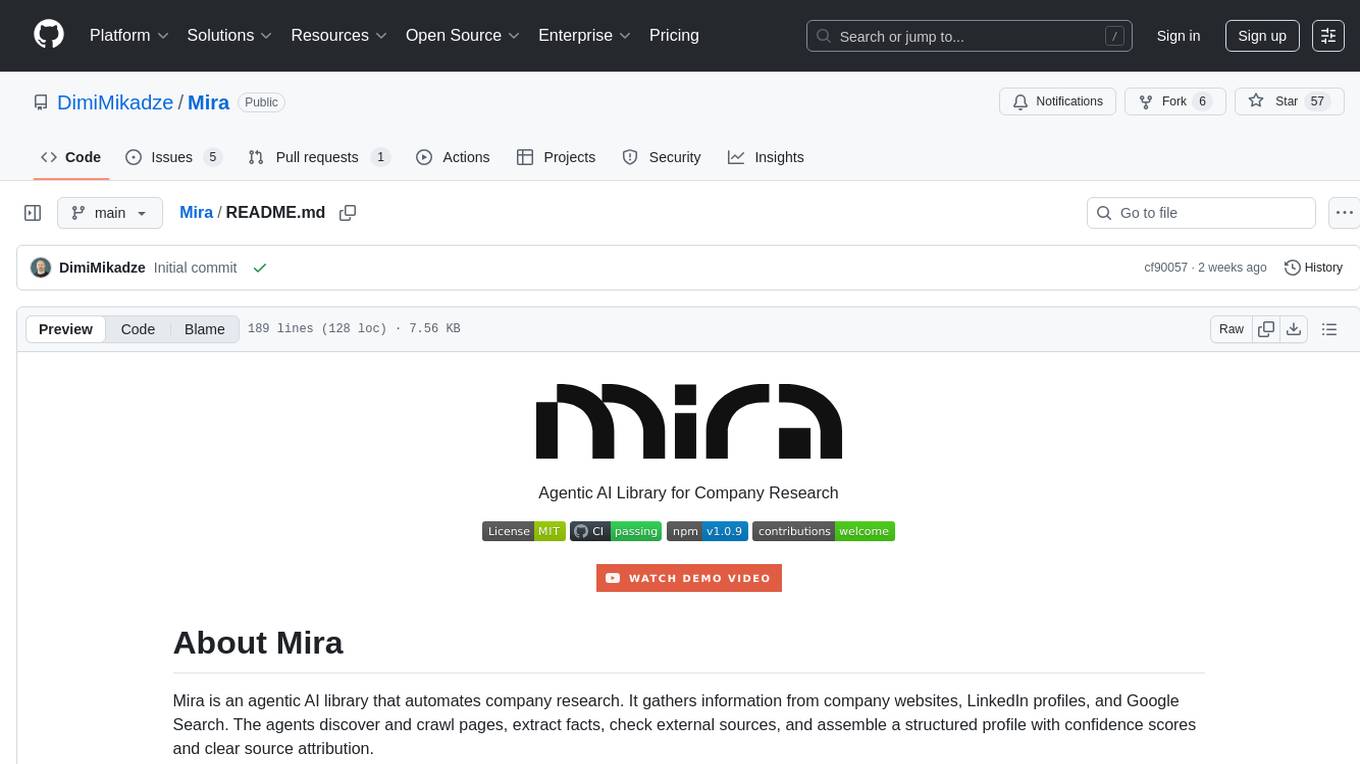
Mira is an agentic AI library designed for automating company research by gathering information from various sources like company websites, LinkedIn profiles, and Google Search. It utilizes a multi-agent architecture to collect and merge data points into a structured profile with confidence scores and clear source attribution. The core library is framework-agnostic and can be integrated into applications, pipelines, or custom workflows. Mira offers features such as real-time progress events, confidence scoring, company criteria matching, and built-in services for data gathering. The tool is suitable for users looking to streamline company research processes and enhance data collection efficiency.
README:
Agentic AI System for Company Research
Mira is an agentic AI system that automates company research with configurable data points and intelligent source selection. It gathers information from company websites, LinkedIn profiles, and Google Search, then assembles a structured profile with confidence scores and clear source attribution.
The system features smart early termination - once all configured data points reach high confidence scores, it automatically stops processing to save time and API costs. Sources are fully configurable, allowing you to enable or disable website crawling, LinkedIn analysis, and Google Search based on your needs.
The core of Mira is a framework-agnostic library that can be published as an npm package or integrated directly into your applications, pipelines, or custom workflows.
To show how it works in practice, this repository includes a complete Next.js frontend application that consumes the core library and provides a full interface with workspace management for running research and viewing results.
- Configurable Data Points – Define exactly what information to collect (company name, industry, funding, etc.) with custom descriptions for precise extraction.
- Intelligent Source Selection – Enable/disable website crawling, LinkedIn analysis, and Google Search based on your needs.
- Smart Early Termination – Automatically stops processing when all data points reach high confidence scores, saving time and API costs.
- Multi-Agent Architecture – Specialized agents handle discovery, internal pages, LinkedIn, Google Search, and analysis, with intelligent orchestration.
- Confidence Scoring & Source Attribution – Each fact includes a confidence score (1-5) and references its source for transparency and trust.
- Company Analysis & Criteria Matching – Generate executive summaries and evaluate companies against custom criteria with fit scores (0-10) and detailed reasoning.
- Personalized Outreach Generation – AI-powered LinkedIn and email outreach message creation based on enriched company data with customizable prompts.
- Realtime Progress Events – Emits structured events during execution so you can track and display live progress.
- Service Layer for Data Gathering – Built-in services handle scraping, Google Search, LinkedIn company data, and cookie consent banners.
- Composable Core Library – Framework-agnostic and publishable as an npm package, ready for Node.js/TypeScript projects.
- Complete Next.js Frontend – Full application showing how to consume the library with workspace management, user authentication, and live progress updates.
Mira takes a company's website URL and your configuration, then intelligently orchestrates multiple AI agents to gather comprehensive company information. You can customize exactly what data to collect and which sources to use.
Configuration
- Data Points: Define custom data points with names and descriptions (e.g., "industry": "Primary business sector or market vertical")
- Sources: Enable/disable website crawling, LinkedIn analysis, and Google Search (landing page is always analyzed)
- Analysis: Optionally enable executive summary generation and/or provide company criteria for fit scoring
Intelligent Orchestration
- Discovery agent analyzes the landing page, extracts social profiles, and identifies relevant internal pages
- Internal pages agent (if enabled) scans discovered pages for data points that need improvement
- LinkedIn agent (if enabled) gathers additional details, but only for missing or low-confidence data points
- Google Search agent (if enabled) queries for remaining gaps using targeted searches
- Company analysis agent (if configured) generates executive summary and/or evaluates company criteria fit
Smart Early Termination
The system continuously monitors data point confidence scores. If all configured data points reach the minimum confidence threshold, processing automatically terminates early to save time and API costs.
Data Merging & Confidence
- Every data point includes a confidence score (1-5) and source attribution
- When multiple sources provide the same information, higher confidence scores take precedence
- Real-time progress events are emitted throughout execution for live status tracking
- Node.js – runtime environment.
- TypeScript – type safety and maintainability.
- OpenAI Agents SDK – multi-agent orchestration and reasoning.
- ScrapingBee – API-based scraping, used for both website crawling and Google Search.
- Zod – runtime schema validation and input/output type enforcement.
- Jest – testing framework for validating services and agents individually.
- Next.js – full-featured interface to run research and display results.
- Supabase – user authentication and workspace storage.
- Workspace Management – create and manage multiple research configurations with custom data points, sources, and analysis settings.
- TypeScript – Consumes core library types.
- TailwindCSS – styling for the UI.
- shadcn/ui – accessible, prebuilt UI components.
- Node.js v18 or later (ensures compatibility with the OpenAI Agents SDK)
- npm (comes with Node.js) or pnpm/yarn as your package manager
-
API Keys:
-
OPENAI_API_KEY— for agent orchestration -
SCRAPING_BEE_API_KEY— for web scraping and Google Search
-
- Supabase Account (for frontend) — user authentication and workspace storage
Mira requires API keys to function. Environment files are used to separate configuration for local development and testing.
For testing the core library, create a .env.test file:
OPENAI_API_KEY=sk-xxxx
SCRAPING_BEE_API_KEY=xxxx
For running the frontend, create a .env.local file with additional Supabase configuration:
OPENAI_API_KEY=sk-xxxx
SCRAPING_BEE_API_KEY=xxxx
NEXT_PUBLIC_SUPABASE_URL=your-supabase-url
NEXT_PUBLIC_SUPABASE_ANON_KEY=your-supabase-anon-key
You can use Mira in two ways:
- Local Development (run the frontend application with workspaces and the core library)
- As an npm Package (use the mira-ai library directly in your own project)
Clone the repository and install dependencies:
git clone https://github.com/dimimikadze/mira.git
cd mira
npm installCreate apps/mira-frontend/.env.local with your API keys and Supabase configuration:
OPENAI_API_KEY=sk-xxxx
SCRAPING_BEE_API_KEY=xxxx
# Supabase
NEXT_PUBLIC_SUPABASE_URL=your-supabase-url
NEXT_PUBLIC_SUPABASE_ANON_KEY=your-supabase-anon-keyRun database migrations:
npm run db:migrateGenerate TypeScript types from your Supabase schema:
npm run generate-typesStart the frontend application:
npm run dev:mira-frontendnpm install mira-aiimport { researchCompany } from 'mira-ai';
const config = {
apiKeys: {
openaiApiKey: process.env.OPENAI_API_KEY!,
scrapingBeeApiKey: process.env.SCRAPING_BEE_API_KEY!,
},
};
const result = await researchCompany('https://company.com', config, {
enrichmentConfig: {
// Define custom data points to collect
dataPoints: [
{ name: 'industry', description: 'Primary business sector' },
{ name: 'employeeCount', description: 'Number of employees' },
{ name: 'funding', description: 'Latest funding round and amount' },
{ name: 'recentNews', description: 'Recent company news or updates' },
],
// Configure which sources to use (landing page is always analyzed)
sources: {
crawl: true, // Enable internal pages crawling
linkedin: true, // Enable LinkedIn analysis
google: true, // Enable Google Search
},
// Configure analysis options
analysis: {
executiveSummary: true, // Generate executive summary
companyCriteria: 'B2B SaaS companies with 50-200 employees', // Evaluate fit against criteria
},
},
onProgress: (type, message) => {
console.log(`${type}: ${message}`);
},
});
console.log(result.enrichedCompany);
console.log(result.companyAnalysis);The frontend application uses Supabase for user authentication and workspace management. Users can sign up and sign in through the Supabase Auth system, with each user having access to their own private workspaces.
This monorepo contains two main packages, each with its own README that provides a deeper look into architecture and usage:
- Mira AI Library — Node.js/TypeScript library with agents, services, and orchestration logic.
- Mira Frontend — Next.js application with workspace management for running research and visualizing results.
If you're developing with AI tools like Cursor, configuration rules are already set up in the root, library, and frontend packages to ensure consistency.
See CONTRIBUTING.md for guidelines.
Distributed under the MIT License. See LICENSE for details.
Logo and UI design by salomeskv
For Tasks:
Click tags to check more tools for each tasksFor Jobs:
Alternative AI tools for Mira
Similar Open Source Tools

Mira
Mira is an agentic AI library designed for automating company research by gathering information from various sources like company websites, LinkedIn profiles, and Google Search. It utilizes a multi-agent architecture to collect and merge data points into a structured profile with confidence scores and clear source attribution. The core library is framework-agnostic and can be integrated into applications, pipelines, or custom workflows. Mira offers features such as real-time progress events, confidence scoring, company criteria matching, and built-in services for data gathering. The tool is suitable for users looking to streamline company research processes and enhance data collection efficiency.

tracecat
Tracecat is an open-source automation platform for security teams. It's designed to be simple but powerful, with a focus on AI features and a practitioner-obsessed UI/UX. Tracecat can be used to automate a variety of tasks, including phishing email investigation, evidence collection, and remediation plan generation.
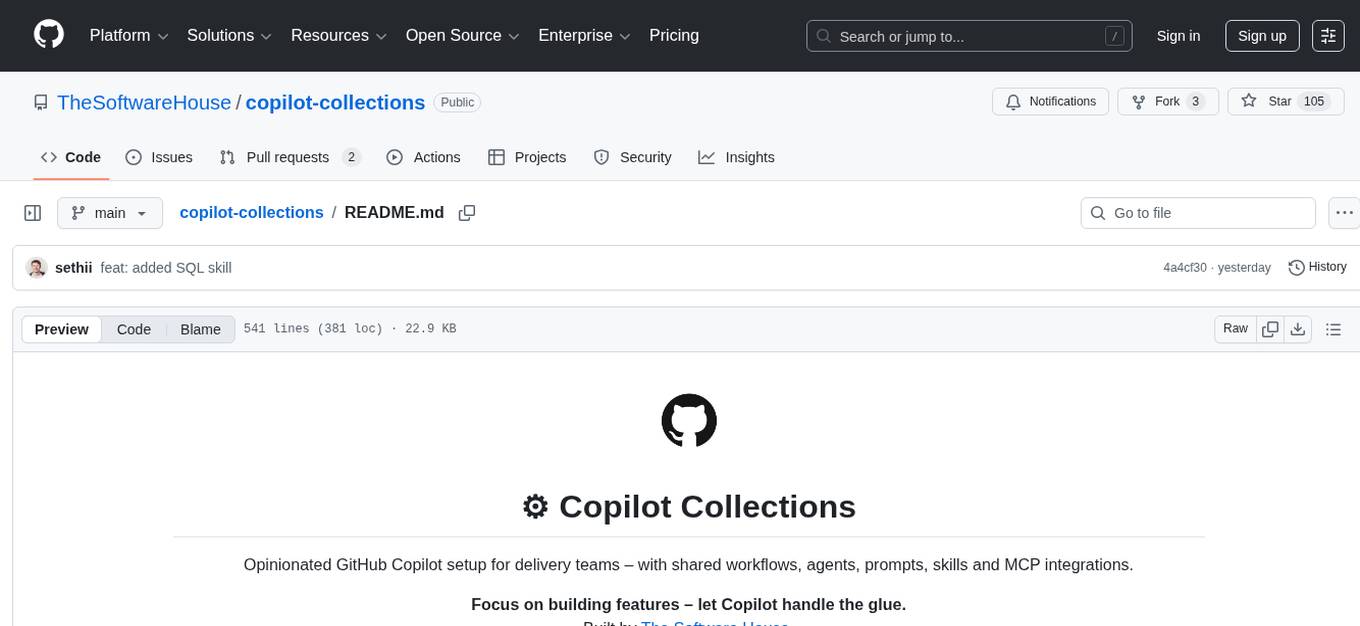
copilot-collections
Copilot Collections is an opinionated setup for GitHub Copilot tailored for delivery teams. It provides shared workflows, specialized agents, task prompts, reusable skills, and MCP integrations to streamline the software development process. The focus is on building features while letting Copilot handle the glue. The setup requires a GitHub Copilot Pro license and VS Code version 1.109 or later. It supports a standard workflow of Research, Plan, Implement, and Review, with specialized flows for UI-heavy tasks and end-to-end testing. Agents like Architect, Business Analyst, Software Engineer, UI Reviewer, Code Reviewer, and E2E Engineer assist in different stages of development. Skills like Task Analysis, Architecture Design, Codebase Analysis, Code Review, and E2E Testing provide specialized domain knowledge and workflows. The repository also includes prompts and chat commands for various tasks, along with instructions for installation and configuration in VS Code.

koog
Koog is a Kotlin-based framework for building and running AI agents entirely in idiomatic Kotlin. It allows users to create agents that interact with tools, handle complex workflows, and communicate with users. Key features include pure Kotlin implementation, MCP integration, embedding capabilities, custom tool creation, ready-to-use components, intelligent history compression, powerful streaming API, persistent agent memory, comprehensive tracing, flexible graph workflows, modular feature system, scalable architecture, and multiplatform support.
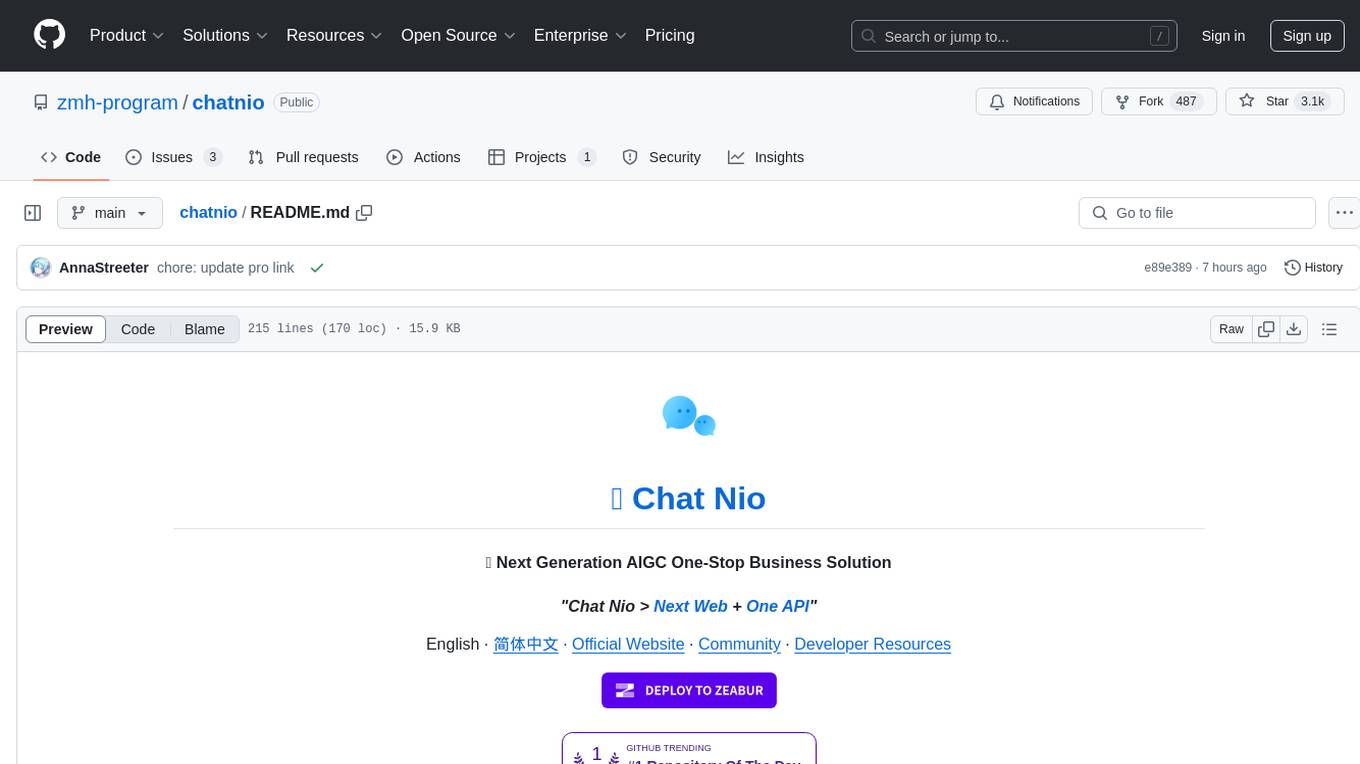
chatnio
Chat Nio is a next-generation AIGC one-stop business solution that combines the advantages of frontend-oriented lightweight deployment projects with powerful API distribution systems. It offers rich model support, beautiful UI design, complete Markdown support, multi-theme support, internationalization support, text-to-image support, powerful conversation sync, model market & preset system, rich file parsing, full model internet search, Progressive Web App (PWA) support, comprehensive backend management, multiple billing methods, innovative model caching, and additional features. The project aims to address limitations in conversation synchronization, billing, file parsing, conversation URL sharing, channel management, and API call support found in existing AIGC commercial sites, while also providing a user-friendly interface design and C-end features.
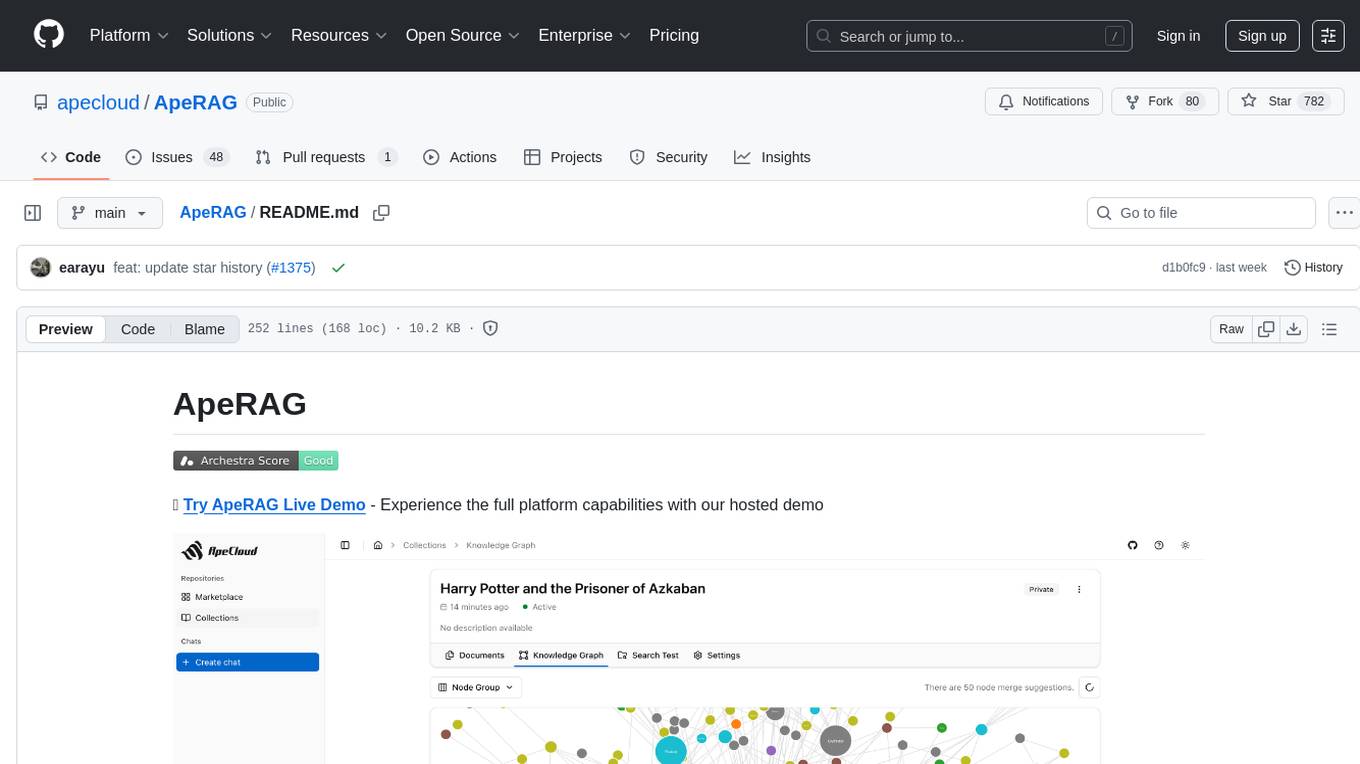
ApeRAG
ApeRAG is a production-ready platform for Retrieval-Augmented Generation (RAG) that combines Graph RAG, vector search, and full-text search with advanced AI agents. It is ideal for building Knowledge Graphs, Context Engineering, and deploying intelligent AI agents for autonomous search and reasoning across knowledge bases. The platform offers features like advanced index types, intelligent AI agents with MCP support, enhanced Graph RAG with entity normalization, multimodal processing, hybrid retrieval engine, MinerU integration for document parsing, production-grade deployment with Kubernetes, enterprise management features, MCP integration, and developer-friendly tools for customization and contribution.
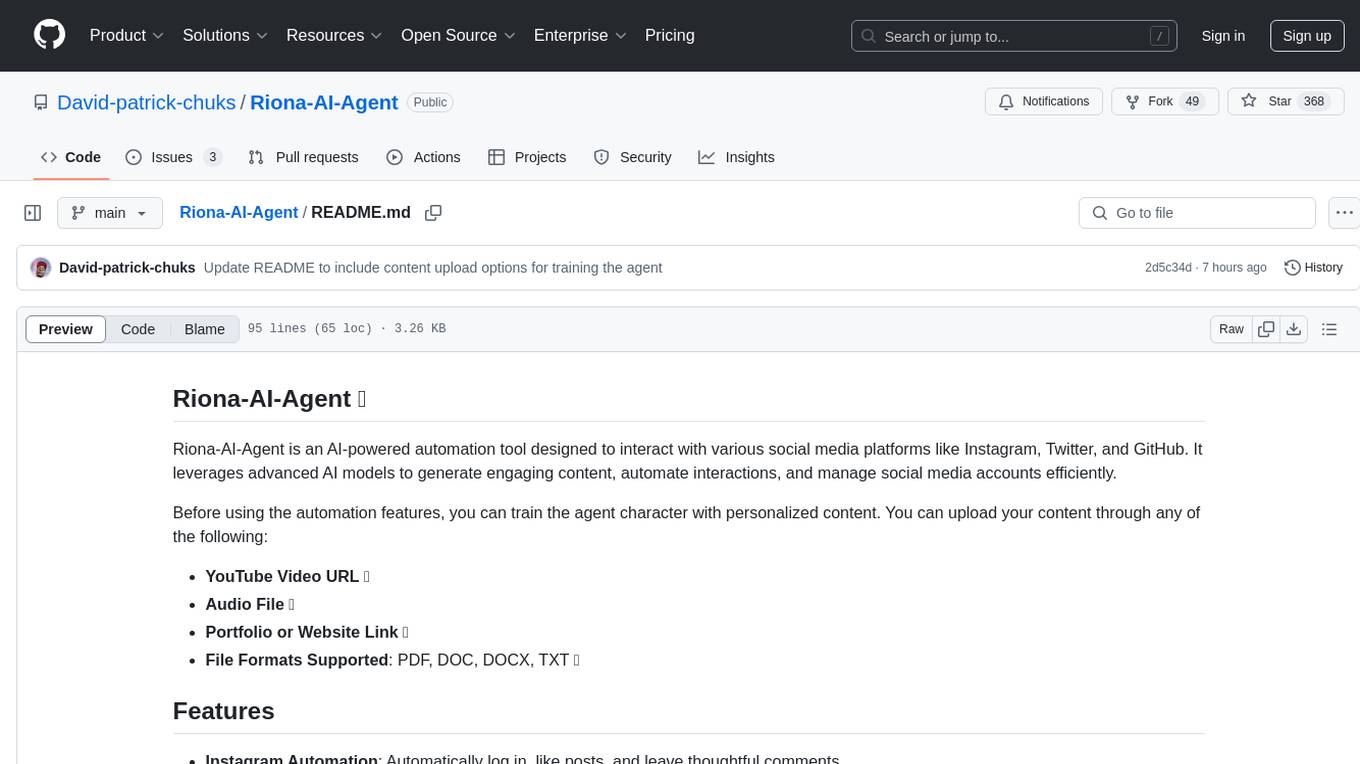
Riona-AI-Agent
Riona-AI-Agent is a versatile AI chatbot designed to assist users in various tasks. It utilizes natural language processing and machine learning algorithms to understand user queries and provide accurate responses. The chatbot can be integrated into websites, applications, and messaging platforms to enhance user experience and streamline communication. With its customizable features and easy deployment, Riona-AI-Agent is suitable for businesses, developers, and individuals looking to automate customer support, provide information, and engage with users in a conversational manner.
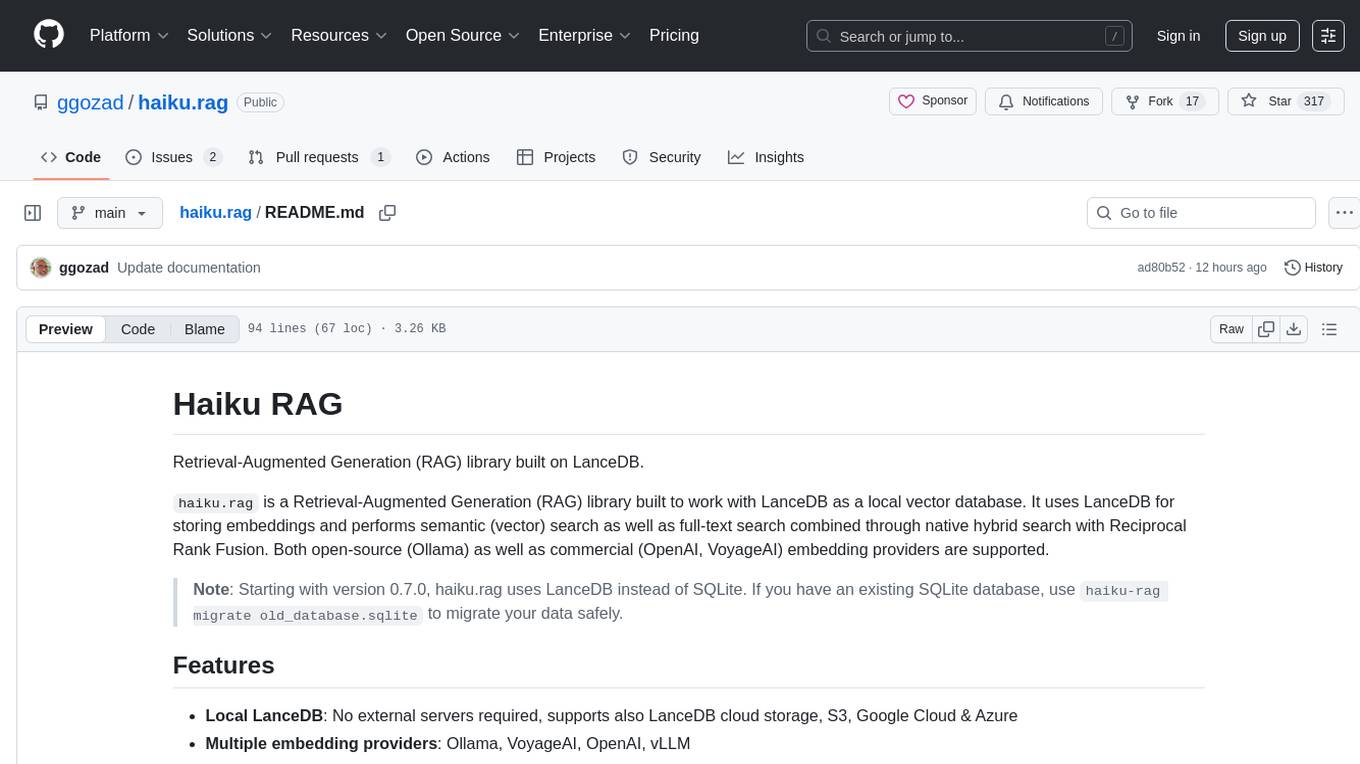
haiku.rag
Haiku RAG is a Retrieval-Augmented Generation (RAG) library that utilizes LanceDB as a local vector database. It supports semantic and full-text search, hybrid search with Reciprocal Rank Fusion, multiple embedding and QA providers, default search result reranking, question answering, file monitoring, and various file formats. It can be used via CLI or Python API, and can serve as tools for AI assistants like Claude Desktop. The library offers features for document management and search, with detailed documentation available.

griptape
Griptape is a modular Python framework for building AI-powered applications that securely connect to your enterprise data and APIs. It offers developers the ability to maintain control and flexibility at every step. Griptape's core components include Structures (Agents, Pipelines, and Workflows), Tasks, Tools, Memory (Conversation Memory, Task Memory, and Meta Memory), Drivers (Prompt and Embedding Drivers, Vector Store Drivers, Image Generation Drivers, Image Query Drivers, SQL Drivers, Web Scraper Drivers, and Conversation Memory Drivers), Engines (Query Engines, Extraction Engines, Summary Engines, Image Generation Engines, and Image Query Engines), and additional components (Rulesets, Loaders, Artifacts, Chunkers, and Tokenizers). Griptape enables developers to create AI-powered applications with ease and efficiency.
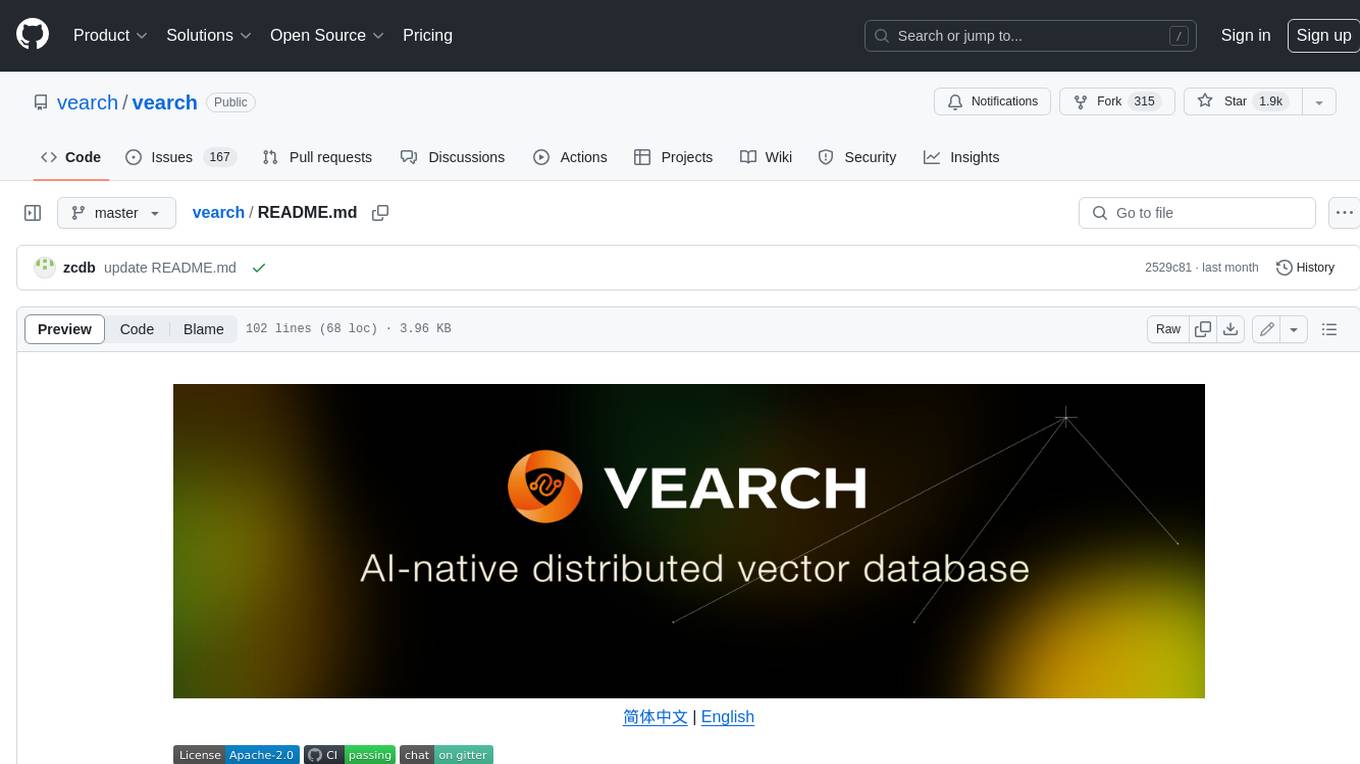
vearch
Vearch is a cloud-native distributed vector database designed for efficient similarity search of embedding vectors in AI applications. It supports hybrid search with vector search and scalar filtering, offers fast vector retrieval from millions of objects in milliseconds, and ensures scalability and reliability through replication and elastic scaling out. Users can deploy Vearch cluster on Kubernetes, add charts from the repository or locally, start with Docker-compose, or compile from source code. The tool includes components like Master for schema management, Router for RESTful API, and PartitionServer for hosting document partitions with raft-based replication. Vearch can be used for building visual search systems for indexing images and offers a Python SDK for easy installation and usage. The tool is suitable for AI developers and researchers looking for efficient vector search capabilities in their applications.
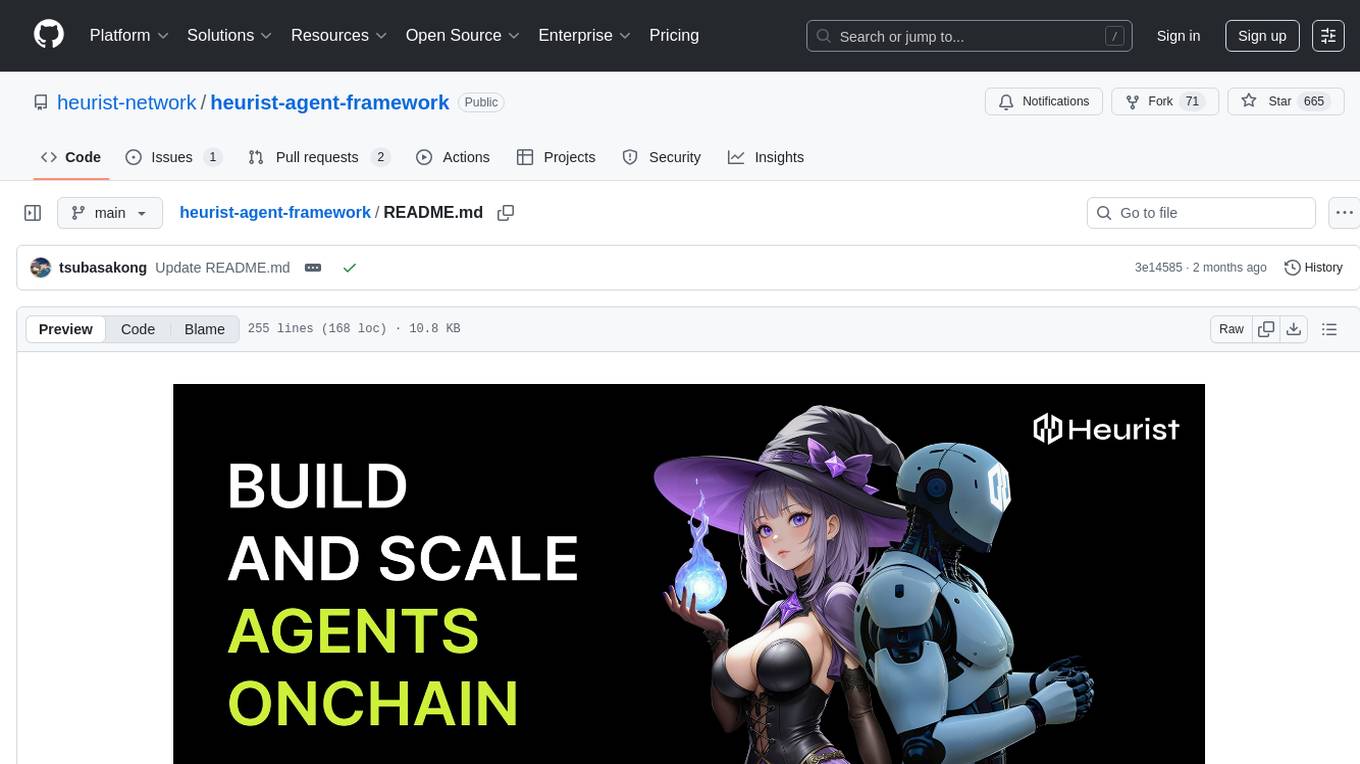
heurist-agent-framework
Heurist Agent Framework is a flexible multi-interface AI agent framework that allows processing text and voice messages, generating images and videos, interacting across multiple platforms, fetching and storing information in a knowledge base, accessing external APIs and tools, and composing complex workflows using Mesh Agents. It supports various platforms like Telegram, Discord, Twitter, Farcaster, REST API, and MCP. The framework is built on a modular architecture and provides core components, tools, workflows, and tool integration with MCP support.
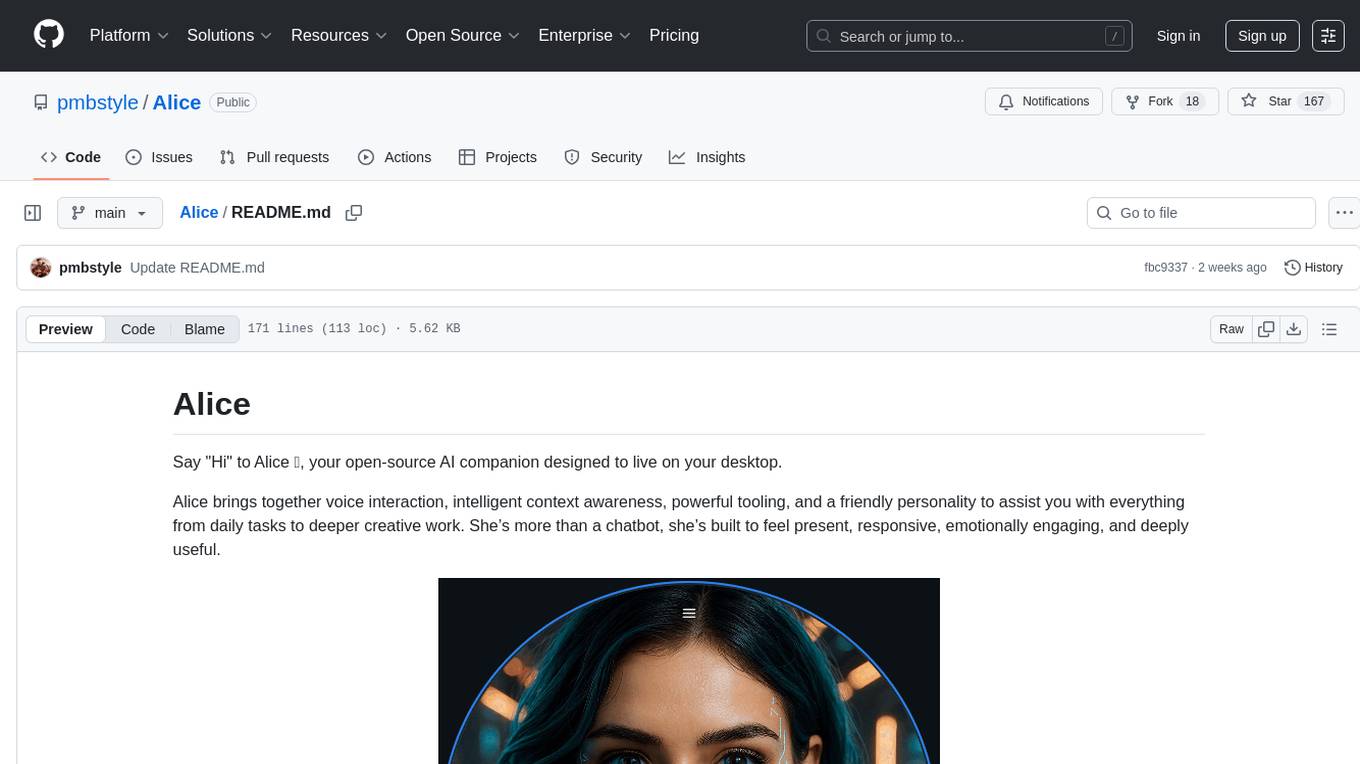
Alice
Alice is an open-source AI companion designed to live on your desktop, providing voice interaction, intelligent context awareness, and powerful tooling. More than a chatbot, Alice is emotionally engaging and deeply useful, assisting with daily tasks and creative work. Key features include voice interaction with natural-sounding responses, memory and context management, vision and visual output capabilities, computer use tools, function calling for web search and task scheduling, wake word support, dedicated Chrome extension, and flexible settings interface. Technologies used include Vue.js, Electron, OpenAI, Go, hnswlib-node, and more. Alice is customizable and offers a dedicated Chrome extension, wake word support, and various tools for computer use and productivity tasks.
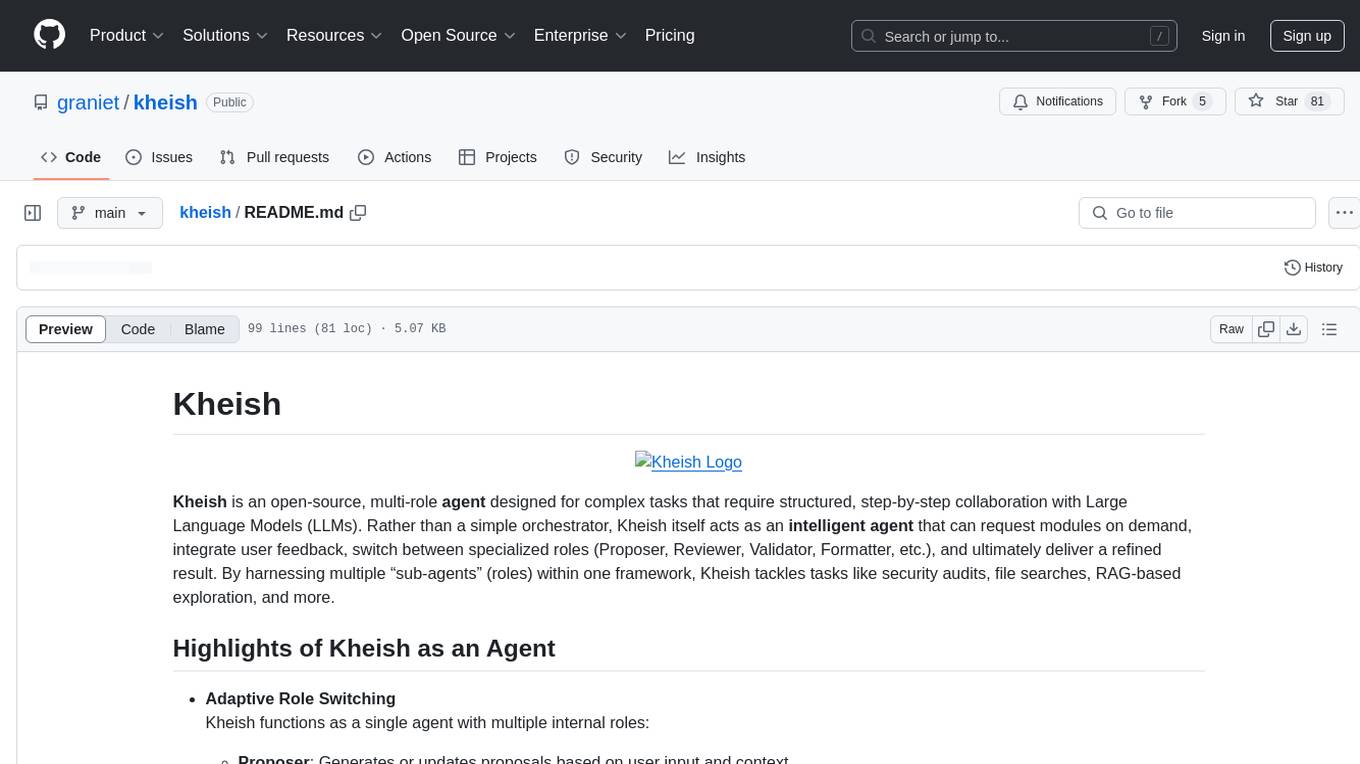
kheish
Kheish is an open-source, multi-role agent designed for complex tasks that require structured, step-by-step collaboration with Large Language Models (LLMs). It acts as an intelligent agent that can request modules on demand, integrate user feedback, switch between specialized roles, and deliver refined results. By harnessing multiple 'sub-agents' within one framework, Kheish tackles tasks like security audits, file searches, RAG-based exploration, and more.
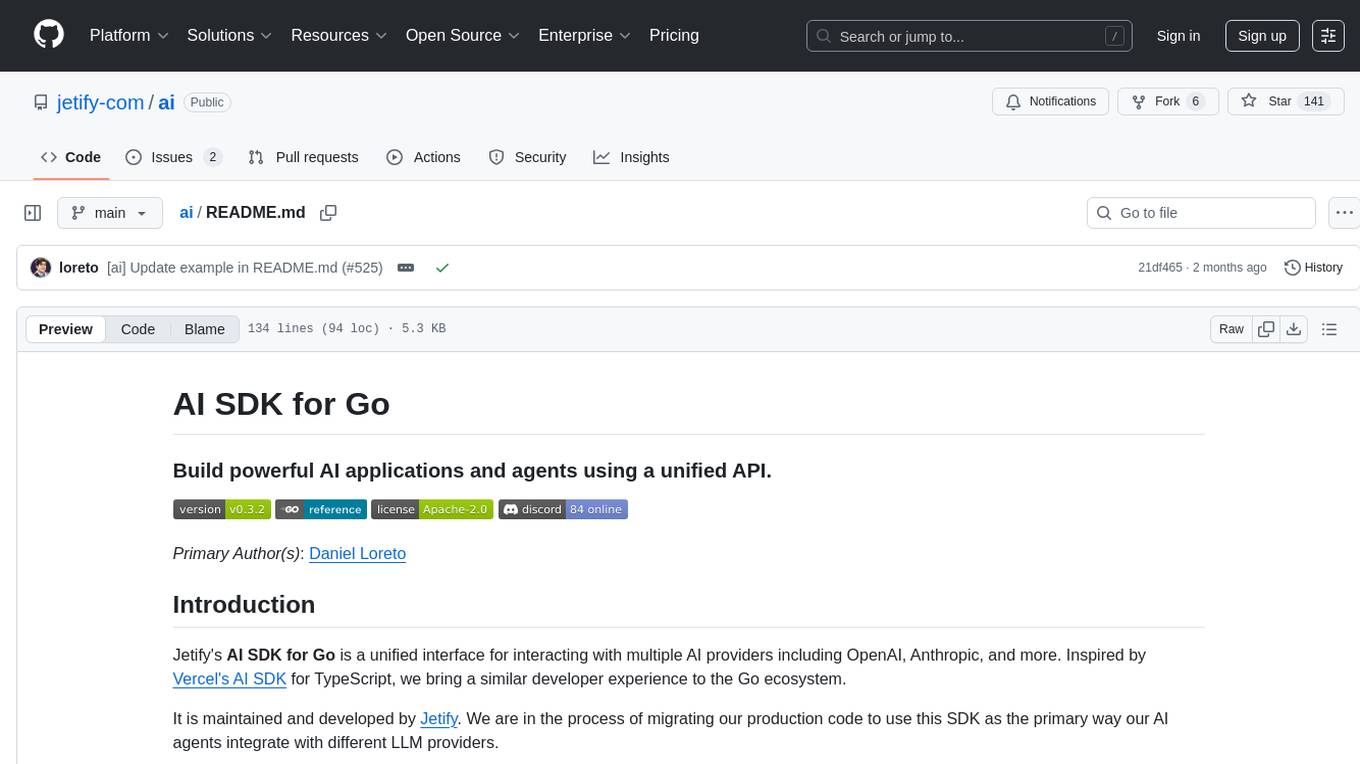
ai
Jetify's AI SDK for Go is a unified interface for interacting with multiple AI providers including OpenAI, Anthropic, and more. It addresses the challenges of fragmented ecosystems, vendor lock-in, poor Go developer experience, and complex multi-modal handling by providing a unified interface, Go-first design, production-ready features, multi-modal support, and extensible architecture. The SDK supports language models, embeddings, image generation, multi-provider support, multi-modal inputs, tool calling, and structured outputs.
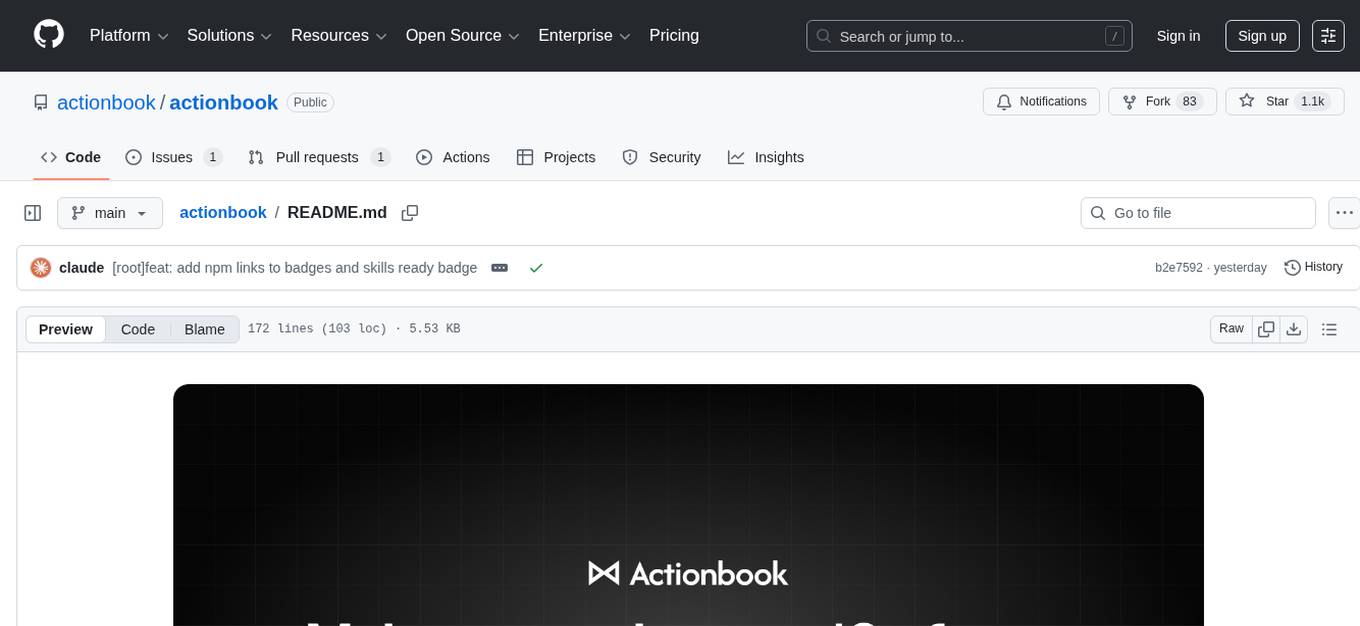
actionbook
Actionbook is a browser action engine designed for AI agents, providing up-to-date action manuals and DOM structure to enable instant website operations without guesswork. It offers faster execution, token savings, resilient automation, and universal compatibility, making it ideal for building reliable browser agents. Actionbook integrates seamlessly with AI coding assistants and offers three integration methods: CLI, MCP Server, and JavaScript SDK. The tool is well-documented and actively developed in a monorepo setup using pnpm workspaces and Turborepo.
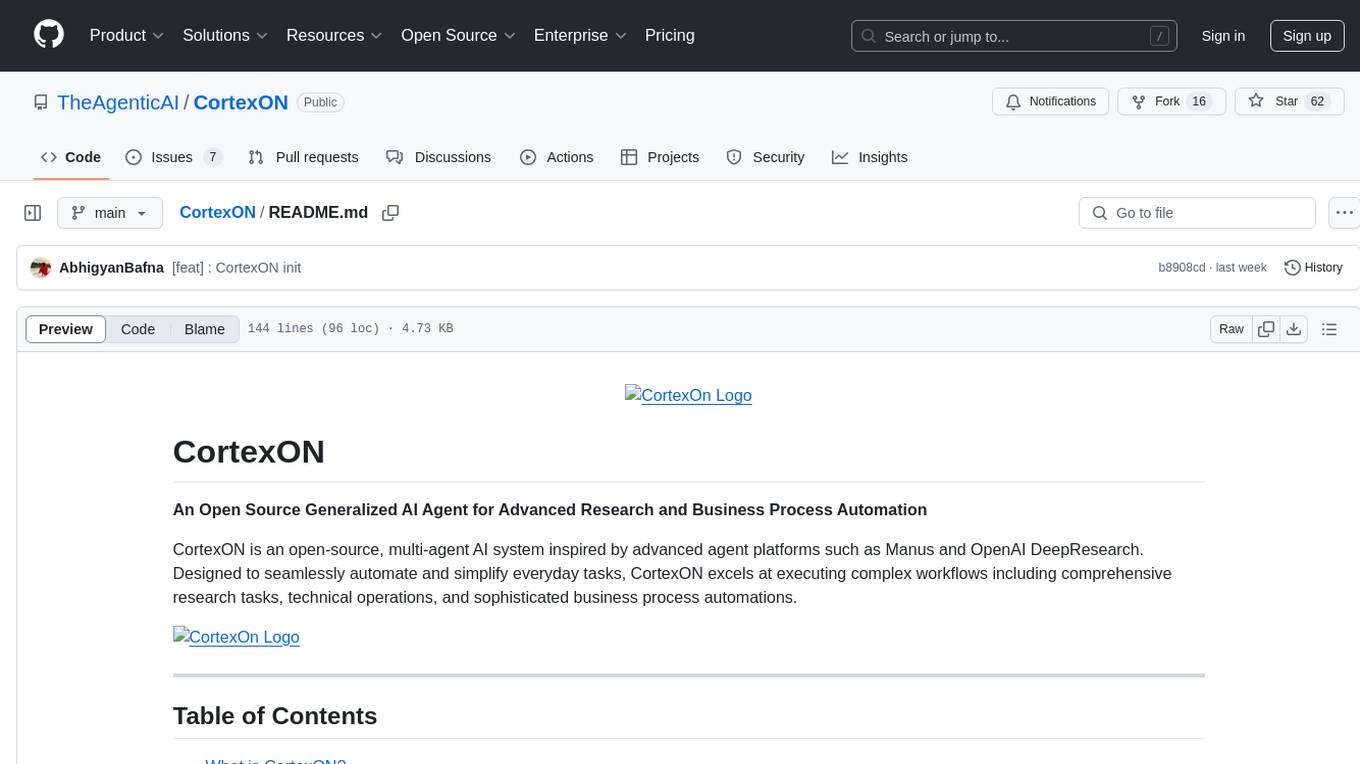
CortexON
CortexON is an open-source, multi-agent AI system designed to automate and simplify everyday tasks. It integrates specialized agents like Web Agent, File Agent, Coder Agent, Executor Agent, and API Agent to accomplish user-defined objectives. CortexON excels at executing complex workflows, research tasks, technical operations, and business process automations by dynamically coordinating the agents' unique capabilities. It offers advanced research automation, multi-agent orchestration, integration with third-party APIs, code generation and execution, efficient file and data management, and personalized task execution for travel planning, market analysis, educational content creation, and business intelligence.
For similar tasks

Mira
Mira is an agentic AI library designed for automating company research by gathering information from various sources like company websites, LinkedIn profiles, and Google Search. It utilizes a multi-agent architecture to collect and merge data points into a structured profile with confidence scores and clear source attribution. The core library is framework-agnostic and can be integrated into applications, pipelines, or custom workflows. Mira offers features such as real-time progress events, confidence scoring, company criteria matching, and built-in services for data gathering. The tool is suitable for users looking to streamline company research processes and enhance data collection efficiency.
For similar jobs

sweep
Sweep is an AI junior developer that turns bugs and feature requests into code changes. It automatically handles developer experience improvements like adding type hints and improving test coverage.

teams-ai
The Teams AI Library is a software development kit (SDK) that helps developers create bots that can interact with Teams and Microsoft 365 applications. It is built on top of the Bot Framework SDK and simplifies the process of developing bots that interact with Teams' artificial intelligence capabilities. The SDK is available for JavaScript/TypeScript, .NET, and Python.

ai-guide
This guide is dedicated to Large Language Models (LLMs) that you can run on your home computer. It assumes your PC is a lower-end, non-gaming setup.

classifai
Supercharge WordPress Content Workflows and Engagement with Artificial Intelligence. Tap into leading cloud-based services like OpenAI, Microsoft Azure AI, Google Gemini and IBM Watson to augment your WordPress-powered websites. Publish content faster while improving SEO performance and increasing audience engagement. ClassifAI integrates Artificial Intelligence and Machine Learning technologies to lighten your workload and eliminate tedious tasks, giving you more time to create original content that matters.

chatbot-ui
Chatbot UI is an open-source AI chat app that allows users to create and deploy their own AI chatbots. It is easy to use and can be customized to fit any need. Chatbot UI is perfect for businesses, developers, and anyone who wants to create a chatbot.

BricksLLM
BricksLLM is a cloud native AI gateway written in Go. Currently, it provides native support for OpenAI, Anthropic, Azure OpenAI and vLLM. BricksLLM aims to provide enterprise level infrastructure that can power any LLM production use cases. Here are some use cases for BricksLLM: * Set LLM usage limits for users on different pricing tiers * Track LLM usage on a per user and per organization basis * Block or redact requests containing PIIs * Improve LLM reliability with failovers, retries and caching * Distribute API keys with rate limits and cost limits for internal development/production use cases * Distribute API keys with rate limits and cost limits for students

uAgents
uAgents is a Python library developed by Fetch.ai that allows for the creation of autonomous AI agents. These agents can perform various tasks on a schedule or take action on various events. uAgents are easy to create and manage, and they are connected to a fast-growing network of other uAgents. They are also secure, with cryptographically secured messages and wallets.

griptape
Griptape is a modular Python framework for building AI-powered applications that securely connect to your enterprise data and APIs. It offers developers the ability to maintain control and flexibility at every step. Griptape's core components include Structures (Agents, Pipelines, and Workflows), Tasks, Tools, Memory (Conversation Memory, Task Memory, and Meta Memory), Drivers (Prompt and Embedding Drivers, Vector Store Drivers, Image Generation Drivers, Image Query Drivers, SQL Drivers, Web Scraper Drivers, and Conversation Memory Drivers), Engines (Query Engines, Extraction Engines, Summary Engines, Image Generation Engines, and Image Query Engines), and additional components (Rulesets, Loaders, Artifacts, Chunkers, and Tokenizers). Griptape enables developers to create AI-powered applications with ease and efficiency.





